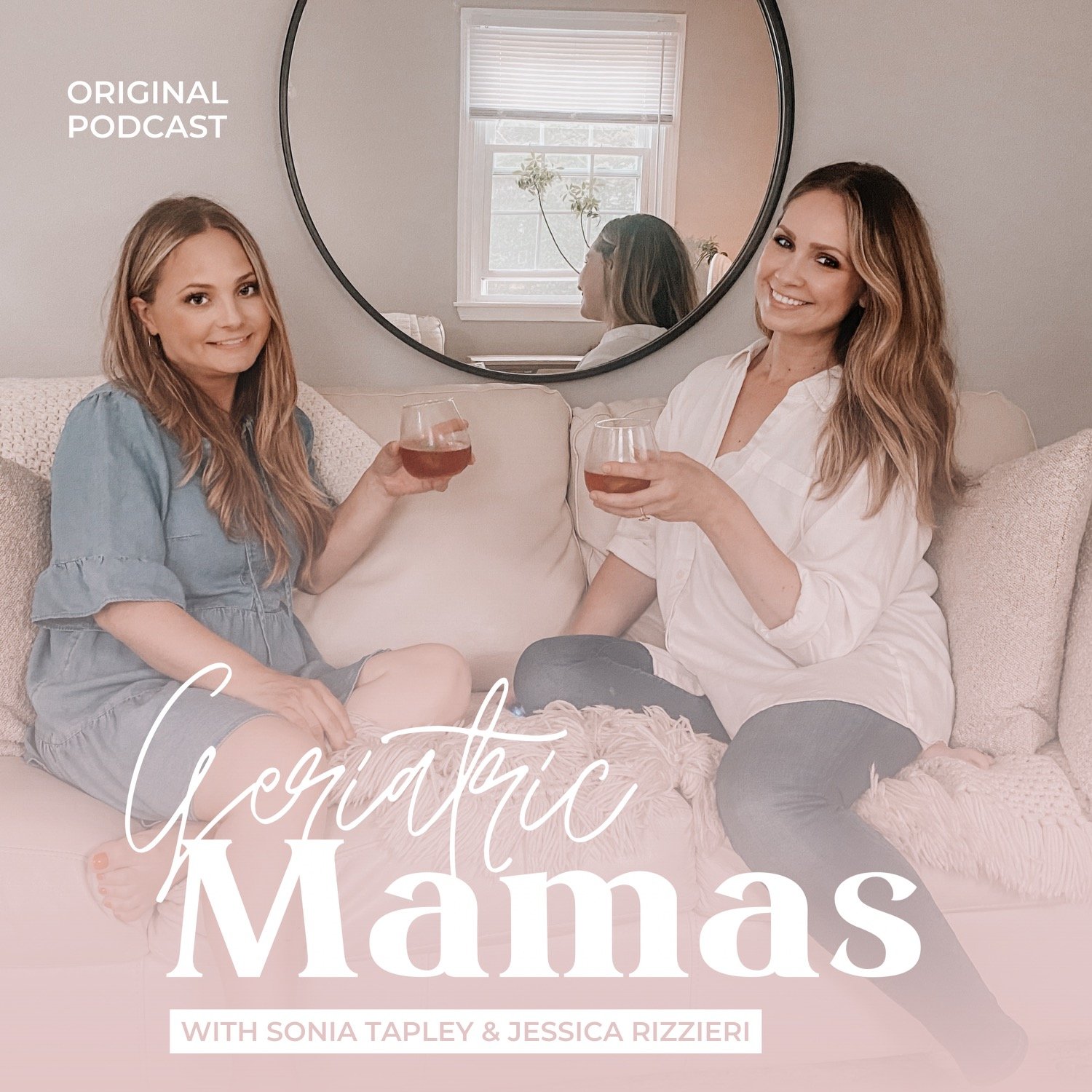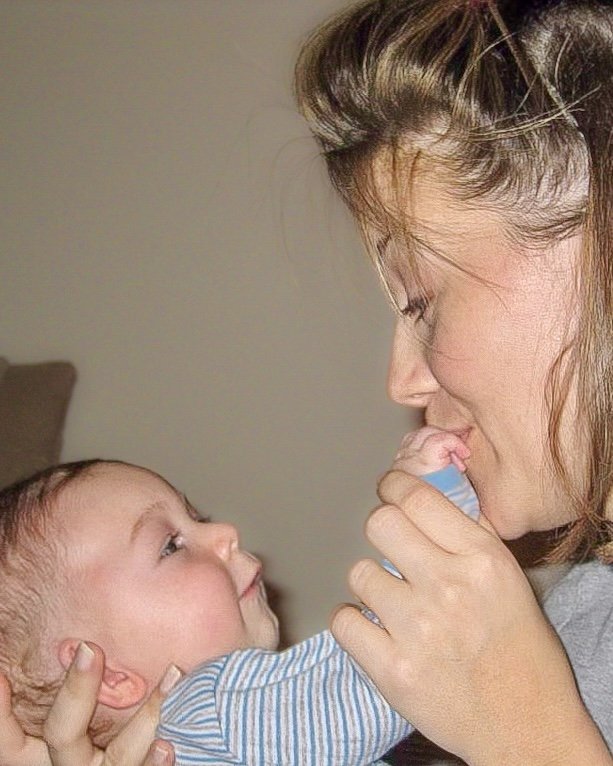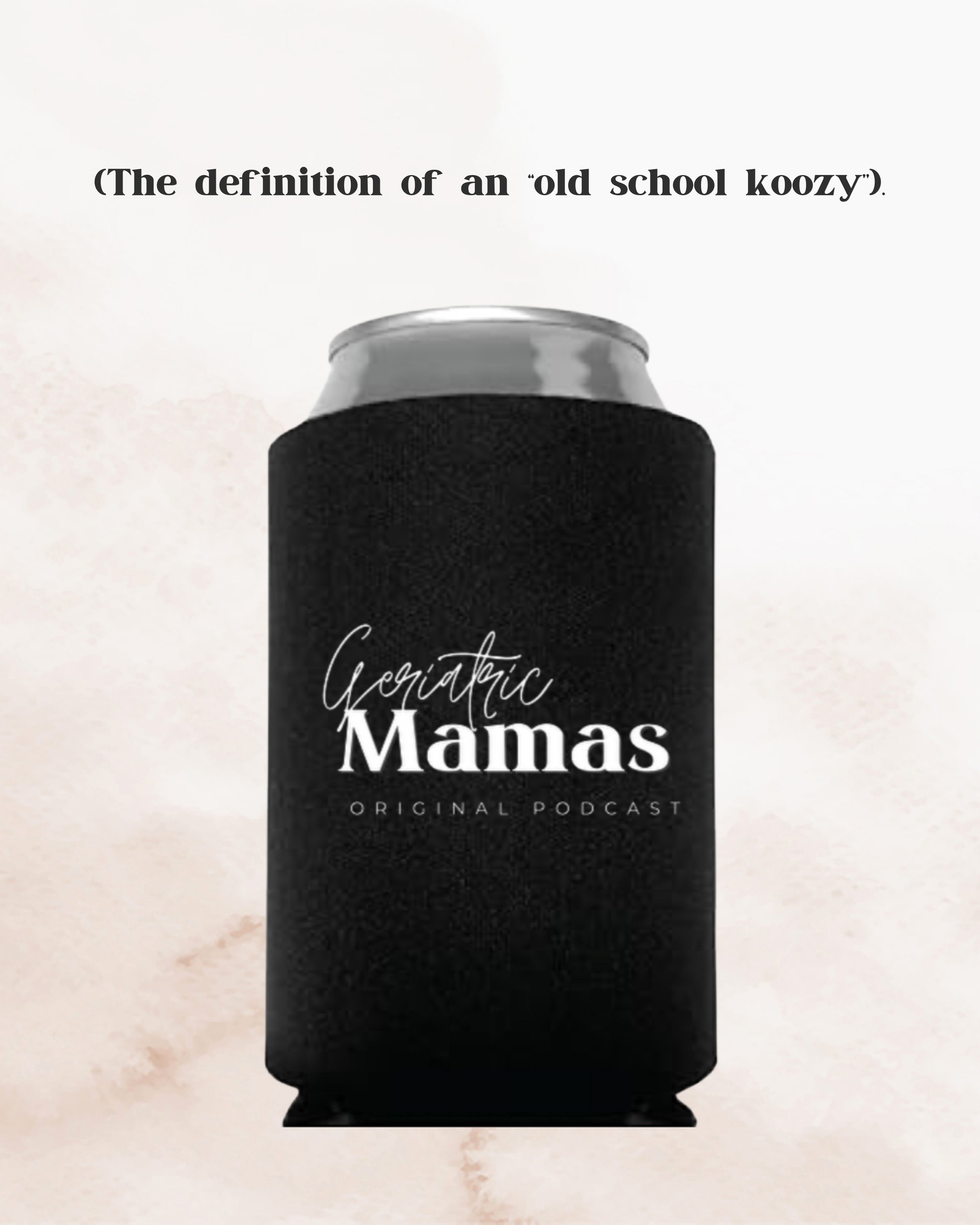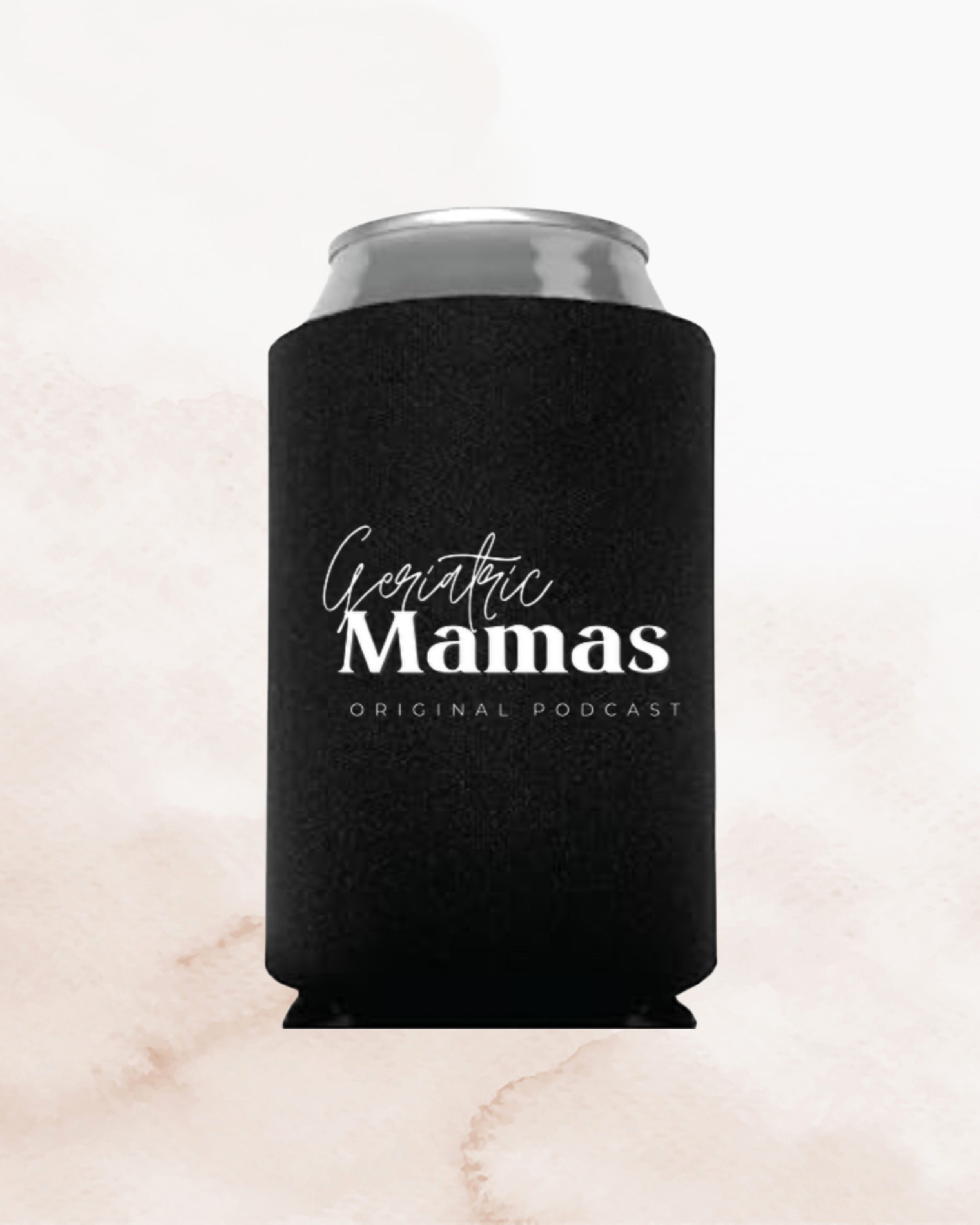Experiencing & Coping with Loss: Courtney’s Story!
On this episode, Sonia and Jessica are joined by Courtney, aka Adam’s fabulous Aunt. Her name has been mentioned several times on the podcast and she’s the reason why ‘Geriatric Happy Hour’ was created. Courtney is joining the Geriatric Mamas to share the story of her two beautiful angel babies, being their mama, coping with loss and the unimaginable grief of loosing her children to SMA Type One in infancy. Also, the state in which Jessica showed up to meet Adam’s family for the first time, (photo in the show notes for your enjoyment).
Topics discussed in this episode:
Welcome Courtney! (2:50)
Courtney’s Story (7:49)
Coping With Loss (1:21:13)
Things People Say And Do To Try And Help, That Are Not Actually Helpful (1:30:30)
The Best Thing People Can Say To Someone Who Has Experienced This Kind of Loss (1:33:22)
Advice For Moms Who Have Also Experienced Loss (1:34:24)
Treatments For SMA (1:42:03)
“I think what people are thinking when they say... you’re the strongest person I know is... thank God this is happening to you and not me, because this stuff only happens to other people. When shit like this happens, you figure out real quick that we’re all other people.”
Courtney with her angel baby, Wayland.
Resources mentioned in this episode:
Sorted Out, Dallas Professional Organizers
Sorted Out is in the business of bringing order to disorder, systems & routines to chaos, and progress to an overwhelming situation. We are in the business of changing lives by giving people more time back in their day, more order to their steps, and more peace in their home through the process of getting organized. We help our clients save time by giving them a functional space that helps them be more productive in life, which also saves them money because they are not buying duplicate items, can plan for expenses, and have more time to make money if that is the desired result.
Who is Gary Busey?
(/ˈbjuːsi/; born June 29, 1944) is an American actor. He portrayed Buddy Holly in The Buddy Holly Story (1978), for which he was nominated for the Academy Award for Best Actor and won the National Society of Film Critics Award for Best Actor. His other starring roles include A Star is Born (1976), D.C. Cab (1983), Silver Bullet (1985), Eye of the Tiger (1986), Lethal Weapon (1987), Hider in the House (1989), Predator 2 (1990), Point Break (1991), Under Siege (1992), The Firm (1993), Drop Zone (1994), Black Sheep (1996) and Lost Highway (1997).
SMA is an inherited disease that affects nerves and muscles, causing muscles to become increasingly weak. It mostly affects infants and children but can also develop in adults. Symptoms and prognosis vary depending on SMA type. Gene replacement and disease-modifying therapies offer hope.
There are four primary types of SMA:
Type 1 (severe): About 60% of people with SMA have type 1 , also called Werdnig-Hoffman disease. Symptoms appear at birth or within an infant’s first six months of life. Infants with type 1 SMA have difficulty swallowing and sucking. They don’t meet typical milestones like holding up their heads or sitting. As muscles continue to weaken, children become more prone to respiratory infections and collapsed lungs (pneumothorax). Most children with type 1 SMA die before their second birthday.
Type 2 (intermediate): Symptoms of type 2 SMA (also called Dubowitz disease) appear when a child is between six months and 18 months old. This type tends to affect the lower limbs. Children with type 2 SMA may be able to sit up but can’t walk. Most children with type 2 SMA live into adulthood.
Type 3 (mild): Symptoms of type 3 SMA (also called Kugelbert-Welander or juvenile-onset SMA) appear after a child’s first 18 months of life. Some people with type 3 don’t have signs of disease until early adulthood. Type 3 symptoms include mild muscle weakness, difficulty walking and frequent respiratory infections. Over time, symptoms can affect the ability to walk or stand. Type 3 SMA doesn’t significantly shorten life expectancy.
Type 4 (adult): The rare adult form of SMA doesn’t typically appear until the mid-30s. Muscle weakness symptoms progress slowly, so most people with type 4 remain mobile and live full lives.
People with SMA are either missing part of the SMN1 gene or have a changed (mutated) gene. A healthy SMN1 gene produces SMN protein. Motor neurons need this protein to survive and function properly.
People with SMA don’t make enough SMN protein, and so the motor neurons shrink and die. As a result, the brain can’t control voluntary movements, especially motion in the head, neck, arms and legs.
People also have SMN2 genes that produce a small amount of SMN protein. A person may have up to eight copies of an SMN2 gene. Having multiple copies of the SMN2 gene typically leads to less severe SMA symptoms because the extra genes make up for the missing SMN1 protein. Rarely, non-SMN gene mutations (non-chromosome 5) cause SMA. (MyClevelandClinic.Org)
There currently is no cure for SMA. However, the discovery of the genetic cause of SMA has led to the development of several treatment options that affect the genes involved in SMA - a gene replacement therapy called Zolgensma, and two drugs, called Nusinersen (Spinraza) and Risdiplam (Evyrsdi). (ChildrensHospital.org)
Cure SMA is the organization that Courtney volunteered with for over ten years. They lead the way to a world where everyone impacted by spinal muscular atrophy is empowered to lead independent, successful, and fulfilling lives.
Our powerful progress includes:
Three approved treatments for SMA
Newborn screening across 100% of the U.S.
More clinical trials happening than ever before
However, our work is not over, and we need your support.
Here’s how Jessica showed up to meet Adam’s family for the first time…
Note: Jessica is (in fact) holding pepto in an old school koozy.
Follow, subscribe, share! We would love to share full episodes with you on there!
Thanks for listening and checking out the show notes!
Please follow, subscribe, rate and review the Geriatric Mamas!
Tell a friend! We need your support!
You can follow us on instagram at @geriatric_mamas, on YouTube @geriatricmamas, Twitter at @geriatricmamas, and follow our facebook page and our Geriatric Mamas group page.
If you have a topic idea you’d like us to discuss, are interested in being a guest, or simply have a funny geriatric story to tell, you can contact us here!
Have a question, comment or correction for this episode of Geriatric Mamas? Leave it for us here!
Share your story on the Geriatric Mamas podcast!
Calling all geriatric mamas! We're looking for women of advanced maternal age who are pregnant, trying to get pregnant, battling infertility, have gone through surrogacy, fostering, adoption or have plans to be a mama in the future to share their stories! Would you like to write in your story and have us read it on your behalf? We would love to hear from you!
Click here to share your story with us and we’ll contact you as soon as geriatricly possible.
Shop the Geriatric Mamas Merch!
Disclaimer:
Please consult your physician for personalized medical and health advice. Always seek the advice of a physician or other qualified healthcare provider with any questions regarding a medical condition, your pregnancy, birth plan and post-partum treatments.
Never disregard or delay seeking professional medical advice or treatment because of something you have heard on the Geriatric Mamas podcast or website.
Guest Disclaimer:
This [Podcast/Website] allows users to post comments and engage in discussions on various topics. The views and opinions expressed in these comments belong solely to the individual authors and do not necessarily reflect the views or opinions of the [Podcast/Website] owner, its staff, or affiliates.
The [Podcast/Website] owner does not endorse or verify the accuracy of the information, claims, or statements made in the comments. The [Podcast/Website] owner shall not be held responsible or liable for any content posted by third parties.
Any user who chooses to rely on the information or opinions expressed in the comments does so at their own risk. The [Podcast/Website] owner disclaims any liability for damages or losses that may arise from such reliance.
Users are encouraged to engage in respectful and constructive discussions. The [Podcast/Website] owner reserves the right to moderate, edit, or remove any comments that violate our community guidelines or terms of use.
By participating in the comments section, users agree to abide by these terms and understand that they are solely responsible for their own comments.
To help support the operating costs of hosting a podcast, please consider donating to the Geriatric Mamas below. We appreciate your support! xx, Jessica & Sonia







